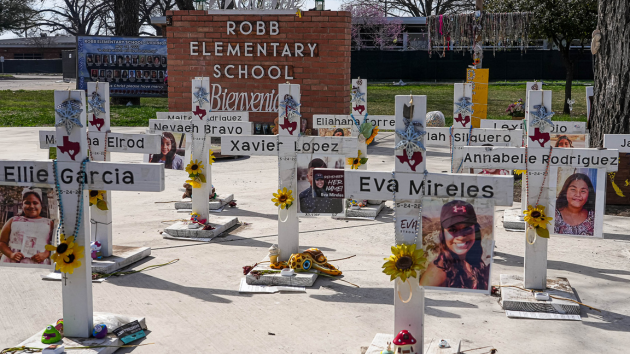2 years after racially motivated Buffalo mass shooting, hate crimes targeting Black people persist
Written by ABC Audio ALL RIGHTS RESERVED on May 14, 2024

(NEW YORK) — As they sat in the lobby of the federal Bureau of Alcohol, Tobacco, Firearms and Explosives in Washington, D.C., last month, Garnell Whitfield Jr. and others who have lost relatives nationwide to gun violence listened as U.S. Attorney General Merrick Garland helped dedicate an exhibit honoring those killed.
Garland spoke of some of the victims on the new “Faces of Gun Violence Memorial” wall, including Whitfield’s 86-year-old mother, Ruth, describing her as a “mother, grandmother and great grandmother whose door and pantry were always open to family and friends.” He said the wall will serve as a reminder to ATF employees of who they are fighting for each day.
“That in and of itself is progress that they would understand the need to be more empathetic and to realize the impact of gun violence on the people that they’re trying to protect and serve,” Whitfield, the retired Buffalo, New York, fire commissioner, told ABC News.
This week marks two years since a self-described white supremacist killed 10 Black people at a Tops supermarket in Buffalo. In addition to Whitfield’s mother, the other victims were Roberta Drury, 32; retired Buffalo police officer Aaron Salter Jr., 55; Heyward Patterson, 67; Pearl Young, 77; Geraldine Talley, 62; Celestine Chaney, 65; Katherine “Kat” Massey, 72; Margus Morrison, 52; and Andre Mackniel, 53.
“I will always carry the scar of 5/14 and what happened to my mother. I’ll always miss her. So, I don’t expect to be healed,” Whitfield said. “I know that’s something everybody talks about. I think that’s kind of an unrealistic expectation.”
One of the major hurdles to overcoming his grief, he said, is that such racially motivated killings and other hate crimes targeting Black people continue to rise across the country.
An ABC News analysis of the most recent FBI data shows that of the more than 8,500 hate crimes reported nationwide between 2020 and 2022, Black people were targeted in 52.3% of the offenses. Between 2021 and 2022, the numbers rose from 2,217 to 3,421, making Black people four times more likely to be targeted than the overall U.S. non-Hispanic Black population.
Hate crimes targeting Black people under the age of 18 rose 10% in 2020, 12% in 2021 and 14.6% in 2022, according to the data.
Among the hate crimes committed since the Buffalo mass shooting was a racially motivated attack at a Dollar General store in Jacksonville, Florida, that left three Black people dead on May 26, 2023. On Nov. 22, 2023, a white gunman wounded two Black and two white shoppers at a Walmart in Beavercreek, Ohio, in what police said was a racially motivated shooting. The gunmen in both rampages died by suicide, according to police.
In February 2023, a Florida man and a Maryland woman, both alleged to be white supremacists, were arrested and accused of plotting to attack multiple energy substations with the purpose of destroying Baltimore, the U.S. Department of Justice announced. Officials said the pair was fueled by a racist extremist ideology as they “conspired to inflict maximum harm on the power grid” and “lay this city to waste.” Both suspects have pleaded not guilty to the charges and are awaiting a trial.
“Honestly, we shouldn’t even have to look at the FBI statistics to know that Black people in America are still victims of subjugation, of discrimination, of racism, of hate,” Whitfield told ABC News. “The fact that’s still the case all these years later tells you a lot about this country and what its intent is for us.”
‘It was a modern-day lynching’
About two months before the massacre at a Tops store in the predominantly Black East Side neighborhood of Buffalo, President Joe Biden signed the Emmett Till Antilynching law, named after a Black teenager who was kidnapped, beaten and killed in Mississippi in August 1955 after being accused of whistling at a white woman. The law defines lynching as a hate crime and increases the maximum penalty to 30 years imprisonment for anyone convicted of conspiring to commit a racially motivated crime resulting in death or serious bodily injury.
To date, no one has been charged under the law.
“There was a reason why it took nearly 200 years to pass an antilynching law in Congress. It’s because the power of lynching is so much embedded into the society,” Gloria J. Browne-Marshall, a professor of law and Africana studies at John Jay College of Criminal Justice, told ABC News.
Browne-Marshall said lynchings were committed to strike fear in Black communities, to “send a message to the community that white men are in charge.”
Browne-Marshall described the Emmett Till Antilynching law as “powerful,” but said prosecutors have been reluctant to apply it to criminal hate crime cases.
“So few prosecutors are doing their jobs when it comes to lynching. We as Americans have ignored the power of the prosecutor to bring charges,” she said.
Browne-Marshall said prosecutors in such high-profile cases as Ahmaud Arbery, a Black jogger who was chased down and killed by three white vigilantes in 2020 near Brunswick, Georgia, initially balked at pursuing charges until widespread protests forced them to take action.
“Without protest, the prosecutors are sitting back and allowing these cases to be put under the rug,” Browne-Marshall said.
But federal prosecutors countered they are using an arsenal of federal hate crime laws to seek justice for victims of racially motivated crimes.
In the Arbery case, the defendants — Travis McMichael, his father, Gregory McMichael, and a neighbor, William “Roddie” Bryan — were convicted on state charges of malice murder, four counts of felony murder, aggravated assault with a shotgun, aggravated assault with a pickup truck, false imprisonment and criminal intent to commit a felony. They were all sentenced to life in prison, the McMichaels without the possibility of parole. They were also convicted of federal hate crime charges, including using violence to intimidate and interfere with Arbery because of his race and because he was using a public street. The McMichaels were given additional life sentences, while Byran received a 35-year prison sentence.
“Protecting civil rights and combatting white supremacist violence was a founding purpose of the Justice Department, and one that we will continue to pursue with the urgency it demands,” Attorney General Garland said following the sentencing of the McMichaels and Bryan.
“Racially-motivated acts of violence are abhorrent and unlawful, and have no place in our society today,” Assistant Attorney General Kristen Clarke of the Justice Department’s Civil Rights Division said earlier this month after a 52-year-old North Carolina man was sentenced to 41 months in prison and three years of supervised release for an unprovoked attack on a Black motorist he shouted racial slurs at and physically assaulted. The attacker, who prosecutors said displayed a Ku Klux Klan flag at his home, was also convicted of physically assaulting a Hispanic neighbor in a hate-filled assault.
“The severe sentence imposed for these vicious hate crimes should send a strong message that perpetrators of hate-fueled violence will be held accountable,” Clarke added. “The Justice Department is steadfast in its commitment to investigating and prosecuting hate crimes wherever they occur in our country.”
Payton Gendron, the gunman in the Buffalo massacre, was sentenced to life in prison without the possibility of parole after pleading guilty to 15 state charges, including 10 counts of murder, three counts of attempted murder and domestic terrorism motivated by hate. In January, federal prosecutors announced they would pursue the death penalty against Gendron.
A federal grand jury indicted the Buffalo gunman with 27 federal charges, including 14 violations of the Shepard-Byrd Act, a landmark anti-hate crime law signed by President Barack Obama in 2009. The law was named after Matthew Shepard, a gay student who was tortured and murdered in Wyoming in October 1998, and James Byrd Jr., a Black man killed in 1998 by white supremacists who abducted him, beat him and dragged him by a chain from the back of a pickup truck.
Garnell Whitfield and Browne-Marshall argued that the Emmett Till Antilynching law should be expanded to include racially motivated mass shootings.
“It was meant to strike fear into our communities, to start a race war and further subjugate us, keep us in our place. So, yes, it was a modern-day lynching,” said Whitfield, adding that the only difference was that the killer used an AR-15 rifle instead of a rope.
While the antilynching law requires proof of a conspiracy, both Whitfield and Browne-Marshall alleged that some social media companies facilitated the teenage killer’s white supremacist radicalization by allowing racist propaganda to fester on their platforms.
“This is a conspiracy. It’s the oldest conspiracy we know – white supremacy,” Whitfield said.
But no precedent has been set for criminally charging a social media company as a co-defendant in a mass shooting, and prosecutors have found no evidence the Buffalo shooter entered into an “agreement” with any social media company to carry out his attack, a requirement of federal conspiracy.
In May 2023, Whitfield and other relatives of those killed in the Buffalo attack filed a lawsuit in State Supreme Court in Buffalo in an attempt to hold several social media companies responsible for aiding the killer in his attack.
The gunman was “motivated to commit his heinous crime by racist, anti-Semitic, and white supremacist propaganda fed to him by the social media companies whose products he used,” the lawsuit argues, adding that the teenager did not appear to have been raised in a racist family, did not live in a racially polarized community and had no reported personal history of negative interactions with Black people.
Some social media companies named in the lawsuit denied the allegations it is aiding the indoctrination of users of their platforms in white supremacy. Twitch, the Amazon-owned social media gaming site the Buffalo gunman used to live stream the shooting, said in a statement that it closely monitors its site and took down the livestream of the Tops rampage in two minutes.
“We take our responsibility to protect our community extremely seriously, and trust and safety is a major area of investment,” Twitch said in its statement in response to the lawsuit, adding it was continuously examining the Buffalo shooting and “sharing those learnings with our peers in the industry to support a safer internet overall.”
Google, the parent company of YouTube, which was also named in the lawsuit, also issued a statement denying the allegations, saying, “Through the years, YouTube has invested in technology, teams, and policies to identify and remove extremist content. We regularly work with law enforcement, other platforms, and civil society to share intelligence and best practices.”
Meta, the parent company of Facebook, Instagram and Threads, said on its website in February, “We define a hate speech attack as dehumanizing speech; statements of inferiority, expressions of contempt or disgust; cursing; and calls for exclusion or segregation. We also prohibit the use of harmful stereotypes, which we define as dehumanizing comparisons that have historically been used to attack, intimidate, or exclude specific groups, and that are often linked with offline violence. We also prohibit the usage of slurs that are used to attack people on the basis of their protected characteristics.”
The Buffalo lawsuit followed the release of a scathing report by New York Attorney General Letitia James’ office, alleging several online platforms played roles in the Buffalo mass shooting by radicalizing the killer as he consumed voluminous amounts of racist and violent content and allowing him to broadcast the deadly attack.
The KKK is ‘alive and well’
Advocates against racism are also getting support from some unlikely people. Scott Shepherd — the former Grand Dragon of the Ku Klux Klan in Tennessee, told ABC News that when he first heard of the Buffalo mass shooting, “it made me sick.”
The 64-year-old Shepherd, who describes himself as a “reformed racist” and now advocates against racial hate, said he also felt guilt.
He said many of the same practices he used to recruit KKK members are still being followed. But instead of rallies and cross burnings, white supremacist groups today use the internet to grow and indoctrinate their ranks, Shepherd said.
“It’s not the robes and hoods, it’s the mentality. And that mentality is what we’ve got to address,” Shepherd said. “As I’ve said before, the internet is a great thing. But that’s one of the tools that’s being used to radicalize these kids.”
‘There’s nothing special about this day’
On Tuesday, a monument titled “Unity” will be unveiled outside the Tops store where the Buffalo mass shooting occurred. A moment of silence will be held at 2:28 p.m. ET marking the time the massacre unfolded followed by a tolling of the bells, officials said.
The 5/14 Memorial Commission will also reveal the design picked for a second monument to be erected in Buffalo that is being funded by the state.
But Whitfield said that for him, the day will be no different from any other.
“So 5/14 may be significant for some, it’s two years now since then. But it’s no more significant on 5/14 than it is on 5/13 or 5/12, or today. I have to live the rest of my life without my mother and with what happened to her,” Whitfield said.
Whitfield said he’ll continue to speak out against white supremacy and is motivated to be as “consistent and determined” in that work as white nationalists are in their deeds.
“Every day since then [5/14] and for the rest of my life, I will honor my mother by doing this work,” Whitfield said. “There’s nothing special about this day coming up because I’ve tried to live according to these principles every day. That’s how I’m going to honor my mother and my ancestors.”
ABC News’ Alexander Mallin contributed to this report.
Copyright © 2024, ABC Audio. All rights reserved.

 KVSP
KVSP 




